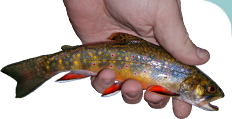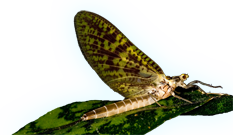Blog & Latest Updates
Fly Fishing Articles
Insects by Common Name


> > From the trout's perspective
| Martinlf | January 24th, 2007, 3:49 pm | |
Moderator Palmyra PAPosts: 3233 | Someone posted this on another board, and I enjoyed it thoroughly. It left me rethinking several of my usual nymphing approaches. Here's the link -- just click it | |
| "He spread them a yard and a half. 'And every one that got away is this big.'" --Fred Chappell | ||
| Upnorth2 | January 24th, 2007, 4:41 pm | |
| Wisconsin Posts: 62 | All good stuff. I believe it was LaFontaine who did this same thing. When I was instructing for the shop in Washington, I could not stress enough the first idea of false casting. I was a short rod person for a long time for this same reason. Anything overhead, the fish get onto it right away, takes about two or three casts and they know. All good points thanks....how are the umbrella flies working for you? On the point of how fish react to flows and currents that was a good section of the fish sitting 45 degrees to a water upwelling. The second hardest thing to get people to understand on the big rivers of the West coast was how steelhead held in them. Often times it was just as easy to let everyone go into the river, read the water and catch steelhead facing downstream when everyone thought they were facing upstream because the water appeared to be flowing that way. One suggestion: Take walking stick and tie a short ribbon on the end and walk a few runs and riffles. I've foung nice calm slots in the Wentachee River for big steelhead doing this. The same applies for finding seepage springs.....just put on the some tennis shoes and when you wade into some cold water and feel it....you are no doubt near a spring. Once you got some of this down it's all presentation, presentation, presentation. I'm not real fond of books myself. I think people should get out and learn their waters for themselves. Thanks again...good stuff. | |
| Trowpa | January 24th, 2007, 7:04 pm | |
| Eastern PA Posts: 31 | Wow - thanks Louis! Great article. | |
| -Steve | ||
| Troutnut | January 24th, 2007, 7:56 pm | |
Administrator Bellevue, WAPosts: 2737 | I fixed the link so you can just click it. (Those long URLs stretch the layout. I thought I had that fixed, but I guess not.) The article looks interesting... I'll read it tomorrow when I've got a bit more time. | |
| Jason Neuswanger, Ph.D. Troutnut and salmonid ecologist | ||
| Martinlf | January 24th, 2007, 8:48 pm | |
Moderator Palmyra PAPosts: 3233 | Upnorth2, I have tied one mean looking baetis, but have to wait for March to try it out. The net provided a description of how to tie tube bodiz, and I adapted the directions by using superfine dubbing, microfibbets, and thread. A Gonzo style burnt polywing provided just the right wing silhouette. I'll be tying more when I get time; work has me jumping just now, and it's been pretty busy around the house too. But I like the design and think it's going to give some educated fish something new to munch on. Thanks for the recommendation. Jason, thanks for fixing the link. | |
| "He spread them a yard and a half. 'And every one that got away is this big.'" --Fred Chappell | ||
| GONZO | January 25th, 2007, 9:32 am | |
Site Editor "Bear Swamp," PAPosts: 1681 | Thanks for sharing this article, Louis. It offers some good pointers and is a pretty good primer for some aspects of nymphing. I do find some of the conclusions to be overly generalized and based on anecdotal observations, but they are still worthy of consideration. | |
| Troutnut | January 25th, 2007, 10:46 am | |
Administrator Bellevue, WAPosts: 2737 | I just watched the videos. Very neat. I agree with Gonzo that it's too anecdotal to be the final word on any of these issues but it's still a very useful set of observations. Ideally I'd like to get a lot more of this kind of thing on Troutnut.com eventually. I'll want to be set up for SCUBA diving and have top-notch underwater photography equipment, all of which will be fairly expensive and time-consuming. Hopefully I'll be able to do that in a few years. | |
| Jason Neuswanger, Ph.D. Troutnut and salmonid ecologist | ||
| Martinlf | January 25th, 2007, 1:01 pm | |
Moderator Palmyra PAPosts: 3233 | Sounds great, Jason. The two points that stuck with me most are the use of yarn indicators, which I've used in the past, but not recently, and the point about tippet size. I agree with Gonzo that the article is too anecdotal to make the broad claims it does, but in skinny water I may lean towards yarn and in heavier flows I may use a slightly larger tippet than in the past. The point about false casting is one I need to be reminded about. Over and over. | |
| "He spread them a yard and a half. 'And every one that got away is this big.'" --Fred Chappell | ||
| CaseyP | January 25th, 2007, 6:33 pm | |
| Arlington, VA/ Mercersburg, PA Posts: 653 | nice when conventional wisdom is backed up by anecdotal research. double rigs can be such a pain, but i will never whine again. the observation about foam indicators bears out my experience, which is why i love foam beetles. question: false casting--were the fish seeing the rod or the line + fly? btw, once i was shown how to tie a double rig with the second fly's tippet through the EYE of the top fly. anyone else tried it? did it make the top fly unattractive or more effective? did it affect the cast (make more tangles)? my casts are tangles waiting to happen anyway so i couldn't tell the difference. | |
| "You can observe a lot by watching." Yogi Berra | ||
| Upnorth2 | January 26th, 2007, 3:49 am | |
| Wisconsin Posts: 62 | David, I agree with you. I think the information has been around for awhile so really what's the problem? This is has been written in how many books and articles? Seems we get another new "authority" posting what has always been around anyway. I was not sure about LaFontaine either since the University of Washington had a good insect department and had studied most of what he wrote about to begin with. Agree on line also. | |
| Troutnut | January 26th, 2007, 11:24 am | |
Administrator Bellevue, WAPosts: 2737 | I only fish less than 5x if the line wont physically fit through the eye of the hook. Even if you fish 8x, the trout DOES see the line. I tend toward using heavier-than-average tippets, too, but there is another rationale for light tippets besides "the fish won't see them." A small fly will drift much more naturally on a really light tippet over any kind of tricky currents. I think this really comes into play for tricos, etc. | |
| Jason Neuswanger, Ph.D. Troutnut and salmonid ecologist | ||
| Trowpa | January 26th, 2007, 11:56 am | |
| Eastern PA Posts: 31 | Exactly Jason - that's is the main reason i switch tippet size. Heavier tippet can mess with both your casting of a small fly and - more importantly the drift and/or action of your fly in/on the water. A larger fly will not be affected as much and you can get a way with heavier (therefore safer) line. The visibility factor is secondary (and the article and some of the posters here suggest it may be almost moot) | |
| -Steve | ||
| Martinlf | January 26th, 2007, 12:37 pm | |
Moderator Palmyra PAPosts: 3233 | Good points all. I think the objections to some of the observations is that the claims were overgeneralized in places--weren't qualified by saying something like, "in some conditions" or "in this situation." For example, David makes a good point in observing that in a strong riffle a foam indicator won't scare fish, and I'd further note that a riffle can drown a yarn indicator at times, and foam balls are better. But in thin water and low flows, IF you need an indicator, yarn may be best. I watched a fellow on the Delaware years ago who in low clear water was fishing a riffle using green indicator that looked like a bunch of moss--much like what was floating everywhere in the water. He scored on those very spooky fish when no one else did. Since then I have carried a small bunch of green and brown mixed yarn for the same purposes, and have used it once or twice. So the article overgeneralizes in a few spots, and insults our intelligence in a few others by telling us what we already know. But hey, it did get us talkin' some and possibly rethinking a detail or two that may keep the skunk away one day. | |
| "He spread them a yard and a half. 'And every one that got away is this big.'" --Fred Chappell | ||
| Martinlf | January 27th, 2007, 9:44 am | |
Moderator Palmyra PAPosts: 3233 | Good points. Larry Tullis's book, Nymphing Strategies, has some very interesting comments on tippet size and on kinds and colors of indicators. He notes that educated trout may come to recognize commonly used indicators as a sign that something bad is about to happen to the food being served. In such situations he advocates using a dry fly or something different (such as white yarn or a white foam ball) from the red indicators most are using. | |
| "He spread them a yard and a half. 'And every one that got away is this big.'" --Fred Chappell | ||
Quick Reply
You have to be logged in to post on the forum. It's this easy:
Related Discussions
| Title | Replies | Last Reply |
| Re: Does indicator affect leader size? In Fly Tying by Gt2003 | 5 | Apr 13, 2019 by Adirman |
| Re: Regal Vises In Fly Tying by CharlieSawd | 22 | Mar 4, 2009 by OMG |
| Re: Nymph and Dry Fly Rigs In General Discussion by Hellgramite | 4 | Jan 6, 2010 by Cdcaddis18 |
| Re: Indicators In General Discussion by Jesse | 30 | Jan 18, 2012 by Doublespey |
| Re: A good day on the battenkill In Fishing Reports by Flyfisher06 | 10 | Jun 13, 2007 by Flyfisher06 |
| Re: rhyacophila/green sedge In General Discussion by Goose | 1 | Sep 13, 2006 by Troutnut |
| Re: Has this happened to anyone else?? In General Discussion by Aaron7_8 | 11 | Sep 16, 2008 by CaseyP |
| Re: Air-Lock Indicators... Thoughts? In General Discussion by Outdoors198 | 11 | Oct 5, 2015 by Planettrout |
| Re: Favorite strike indicators? In Gear Talk by Cptenn94 | 12 | Nov 19, 2015 by Wbranch |
| Re: Looking for a leader formula... In Gear Talk by OldHasBeen | 6 | Jul 8, 2020 by Wbranch |
Troutnut.com is copyright © 2004-2024 Jason
Neuswanger (email Jason). See my FAQ for information about use of my images.
 privacy policy
privacy policy



